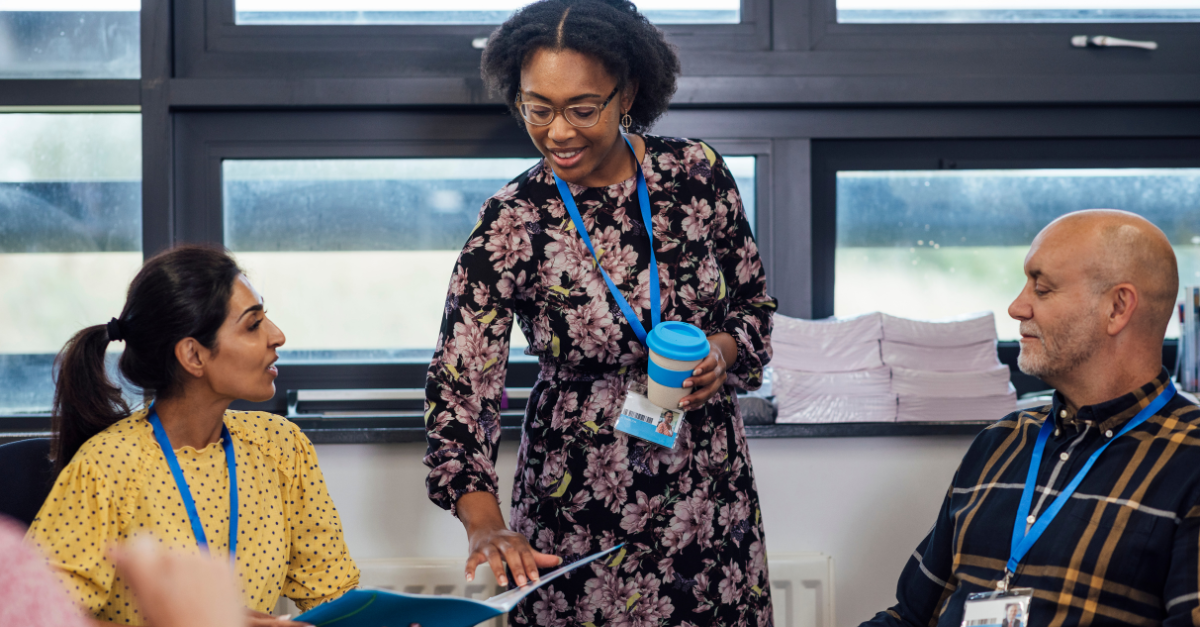Establishing a welcoming community for all educators working in child care is paramount in fostering an environment where diversity is embraced, and where all childcare professionals feel valued. Recognizing the importance of continuing education, our journey begins by diving into the impact of training sessions, ensuring that all educators acquire the essential knowledge needed to create a supportive and inclusive educational space. We explore the significance of ongoing professional development in the early childhood workforce and its transformative impact on the learning experiences educators cultivate for young minds.

Creating a positive work environment in child care
Establishing a welcoming and inclusive community is a fundamental aspect of cultivating a positive work environment. In the following sections, we will dive into the essential components that contribute to the creation of a truly welcoming community.
In the ever-changing world of early childhood education, it’s important for educators to understand the powerful impact of creating a community that goes beyond just getting things done and crossing items off the daily checklist. The term ‘welcoming community’ encompasses more than physical spaces and aesthetically pleasing surroundings; it encapsulates a culture where mutual respect, open communication, and a shared commitment to professional growth thrive. Here, professional development emerges as a linchpin, serving as the catalyst for individual and collective progress. In understanding its centrality, we acknowledge that an investment in ongoing education and skill enhancement is not only a personal pursuit but an essential contribution to the early childhood community as a whole.

As early childhood professionals, we hold a unique responsibility—one that goes beyond the traditional role of imparting knowledge. In the field of child care the influence of educators extends to shaping the very foundation of a child’s worldview, and it is within the framework of a welcoming community that this influence can be most impactful. Professional development initiatives become the conduits through which we refine our teaching methodologies, stay up to date and adapt to the evolving needs of diverse learners.
The idea of a welcoming community highlights the interwoven nature of our roles as educators, emphasizing the importance of the connections we build with children, families, and the entire community. It compels us to be proactive in seeking out opportunities for growth, not just for personal fulfillment, but as a means of ensuring we are providing high-quality care for children and families. By engaging in continuous professional development, we not only enhance our individual capabilities but contribute significantly to the collective expertise of the early childhood community.
Building a welcoming community
The initial step in fostering a welcoming community in your child care involves diving deeper into the comprehensive understanding of what this concept means, especially within the context of early childhood professionals. Moving beyond the superficial impressions of visual elements such as posters and flags, the core of a welcoming community involves many different aspects working together. To foster a welcoming community, it’s essential to appreciate diversity and recognize the unique strengths of each member of the team. This inclusivity extends beyond a mere acknowledgment of differences; it involves actively promoting open communication channels that facilitate the exchange of ideas, experiences, and perspectives among child care providers.

Another crucial element of creating a welcoming community is ensuring that every member experiences a profound sense of belonging on a daily basis within the childcare environment. This sense of belonging extends beyond a passive state of acceptance, but involves an active cultivation of an atmosphere where every individual feels valued, respected, and integral to the collective mission of fostering high-quality programming and positive early childhood development.
Being a welcoming leader
Drawing upon my experience as a leader in a customer success team, I have come to realize the remarkable parallels that exist between effective leadership within a professional setting and the art of teaching in the classroom. Whether in a corporate environment or an educational setting, the principles that underpin successful leadership are universal. These principles hinge on actively listening, recognizing and appreciating the contributions of each team member or student, and acknowledging the unique qualities that each individual brings to the table.

In this context, professional development takes on an even more critical role, as it involves not only the honing of leadership skills but also the cultivation of an inclusive environment. This dual focus on leadership and early childhood professional development is integral to creating a collaborative and empowering atmosphere that mirrors the ideals of effective leadership both in and out of the classroom.
Building genuine connections
Creating a welcoming community requires intentional efforts, such as asking questions, sharing personal anecdotes, being mindful of speaking more than listening, and actively seeking opportunities to support fellow educators. This collaborative approach not only enhances professional development for child care providers but also strengthens the overall fabric of the early childhood workforce.
Prioritizing continuing education and fostering genuine connections contributes to a robust sense of community, promoting a supportive environment within a childcare center.
The role of inclusive education
Humphreys (2009) emphasized that inclusive education begins with a supported teacher. The foundation for inclusivity in child care is laid when educators learn to practice it themselves, supported by both peers and the leadership team at their center. This support is not only crucial for building inclusive education, but for sustaining an inclusive environment that empowers young children, families and child care providers.
Professional development opportunities

To authentically cultivate a welcoming community, a commitment to early childhood professional development is indispensable. This commitment encompasses fulfilling required training hours and avenues for continuous growth within the early childhood field. High quality professional development tools will equip educators with the essential knowledge and skills to empower children, and themselves, while they craft inclusive environments that enrich the learning experience for all.
Mutual respect and support
Mutual respect and support are the foundation of a welcoming culture among educators, setting the stage for creating a nurturing environment that extends to the children and families they serve.
Experienced educators play a vital role by teaming up with newer colleagues, giving guidance, and showing the values learned through ongoing professional development. This not only helps everyone grow but also sets a strong example for creating an inclusive and supportive educational environment.
Conclusion
Creating a welcoming community in early childhood education involves more than just physical elements— it’s about fostering a culture of mutual respect, support, and continuous professional development. By actively engaging in these practices, educators contribute to an environment that not only enhances their own experience but also positively impacts the lives of the young children they nurture. Professional growth in the early childhood field is not just a personal endeavor; it’s a collective responsibility towards building a brighter future for our children.
To support educators and leaders in in building a welcoming community for all, browse our professional development platform Lillio Academy, for certified training sessions across the North America.



